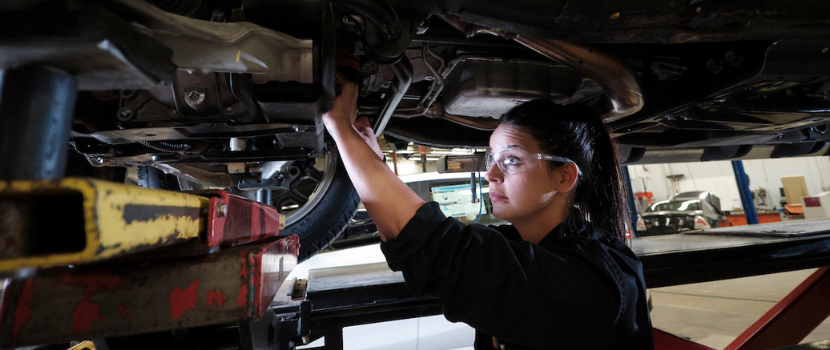
If you enjoy working on cars and trucks, Saskatchewan Polytechnic’s Automotive Service Technician program can fast-track you into a career. In less than a year, you could be working as a technician in an automotive shop, car and truck dealership, specialty shop, service station or transportation company.
Start date
September - Moose Jaw and Saskatoon (domestic students only)
Length
36 weeks
Location(s)
Moose Jaw, SaskatoonYou’ll need good problem-solving skills, mechanical aptitude and manual dexterity. At the end of the program, you’ll have transferable skills you can apply to other trades, including agricultural machinery technician, heavy duty equipment technician, truck and transport mechanic.
Automotive Service Technician is a one-year certificate program offered in Moose Jaw and Saskatoon. You’ll learn how to diagnose, repair, service and maintain advanced mechanical and electrical systems in today’s vehicles. Get practical, hands-on training in:
- body and trim
- brakes and chassis
- charging, ignition and starting systems
- transmissions and drive lines
- electronics and electrical systems
- engine repair
- fuel and emission systems
- general shop procedures

Learn in well-equipped shops
Trade to degree
Career and salary information
Your career
When you graduate, look for jobs as an apprentice technician in an automotive shop or service station, in the service or warranty department of vehicle dealerships, in engine machine shops and engine building plants. You could work for a public transit agency, a transportation company or a large company that maintains a fleet of vehicles.
Potential careers
| Sample job title | NOC classification |
|---|---|
| Automotive service technician | Automotive service technicians, truck & bus mechanics & mechanical repairers (72410) |
Admissions
Admission requirements
- Grade 12
- English Language Requirement
Note
- Applicants should be physically mobile, capable of moderate lifting and have good manual dexterity.
- A valid driver's license is a requirement in order to operate and road test motor vehicles.
Alternative admission
Applicants who do not possess the academic qualifications for a program may be admitted if evidence of probable success can be established through an alternative admission assessment. Applicants are automatically considered for alternative admission. However, some specific admission requirements may still need to be met.
ACCUPLACER©
Refer to the ACCUPLACER© cut scores for this program below, and review additional details concerning Alternative Admission using Accuplacer.
- 250 Arithmetic
- 247 Reading
- 241 Writing
Post-secondary
Some programs allow applicants to meet the admission grade level requirement using 15 approved post-secondary credits. Review additional information.
Admission method
First Qualified/First Admitted
The First Qualified/First Admitted (FQFA) process is used for the majority of Saskatchewan Polytechnic programs. When we determine that you meet the program's admission requirements, you will be offered admission based on the date you fully qualify for the program. The earlier you provide the appropriate documents and information that qualify you for admission to the next intake, the earlier you might begin your studies.
Applications for all FQFA programs open September 1 each year.
Sponsored programs or programs targeted to specific groups do not accept applications year round or maintain an application pool.
See Admission Processes for more information about this method of admission.
Tuition and fees
Estimates are based on current rates and are subject to change. Amounts for a program may vary by campus. Totals shown here include all mandatory fees as well as approximate cost for books and supplies. Visit the Tuition and Fees web page for a complete breakdown of tuition and fees for this program.
2025-26 academic year
$10,760
Courses
Classroom time will include demonstrations and shop work.
Get credit for what you know
Prior Learning Assessment and Recognition
Saskatchewan Polytechnic recognizes that adults learn in many different ways. This includes acquiring knowledge and skills through life and work experience or non-formal training.
See link(s) below to get more information about PLAR.
Transfer credit
Many Sask Polytech students benefit from transferring course credit. You may be eligible to transfer credit to Sask Polytech or to another college or university.
Student awards
Thanks to the generosity of donors and alumni, Saskatchewan Polytechnic gives away more than $2 million in student awards during the academic year.
Saskatchewan Polytechnic offers student awards for every certificate and diploma program at every campus. Not all student awards are based on marks - some are based on financial need or things like community or volunteer involvement.
Related programs
Agricultural Machinery Technician
Heavy Equipment and Truck and Transport Technician

